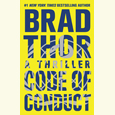Should She Stay, or Should She Go?
An overscheduled woman walks out on her life in Gayle Forman’s Leave Me
Here is a list of items Maribeth Kline accomplishes during her heart attack: a semi-successful night’s sleep; dressing, feeding, and carting her twins to preschool; reading a book to her daughter’s class; checking her email; meeting with a former colleague; and showing up for her doctor’s appointment on time. Sound familiar? Maribeth—the protagonist of Leave Me, the first novel for adults by bestselling YA author Gayle Forman—doesn’t have time for a heart attack. Between editing a celebrity-lifestyle magazine, prepping for events at her twins’ school, and keeping her household running, a dire health emergency is too low a priority to be feasible. And yet, like much of life, it happens anyway.

Some of the most endearing things about Forman’s Leave Me are its real-life moments. In the twenty pages leading up to Maribeth’s heart attack, the list of her mundane responsibilities, universal worries, and everyday irritations is staggering. Even on the way to the hospital, Maribeth is scheduling her children’s school pickup and trying to communicate with her husband about dinner. In the hospital, Maribeth is still working—reading emails and troubleshooting plans for the next day. When an ancient doctor with a terrible bedside manner tells her she’ll need to stay for further testing, her response is, “Okay. How long does it take?”
Maribeth cannot seem to find a way to put her life on pause—until she has no choice. But even recovering from a cardiac disaster, she’s beset by obligations. In the face of her husband’s continued responsibility-shirking, her mother’s overbearing presence, her children’s lice epidemic, and problems at work, Maribel does the unthinkable: she walks out.
And that’s when Forman’s narrative skills really kick in. Maribeth is such an earthy, sympathetic character that readers can’t help but become attached to her during the early chapters of the novel. By the time she walks out on her family, we’re already invested, even though her actions seem inexcusable. She’s an adult, right? She can communicate her needs to her husband, reach out to a friend, get counselling? But she doesn’t, and that drives home one of the questions this novel explores: what do you do if you don’t know how to make space for yourself in your own life? Whom can you turn to if you can’t trust yourself?
Maribel’s choice to walk away takes up most of the space in the novel, testing a reader’s sympathies. If you’re feeling pro-Maribel during one chapter, you can focus on the fact that she feels that to stay is to risk another heart attack, each request from her husband increasing the odds of a recurrence. If you’re feeling pro-Maribel’s family, you might become incensed by her complete failure to communicate with her children. Such emotional complexity sets this protagonist apart from the predictable stock characters of working women in many novels today.
Should Maribel go home, or should she invest in a new life? Subplots involving a hint of romance and a search for her biological mother, as well as a group of entertaining supporting characters, keep the plot moving until she makes her final decision. All in all, Leave Me will leave readers introspective about their own lives and the compromises they make with themselves to stay with those they love.

Sarah Carter is a high-school English teacher living and working in Lebanon, Tennessee. She is currently an M.F.A. candidate at the Sewanee School of Letters.


